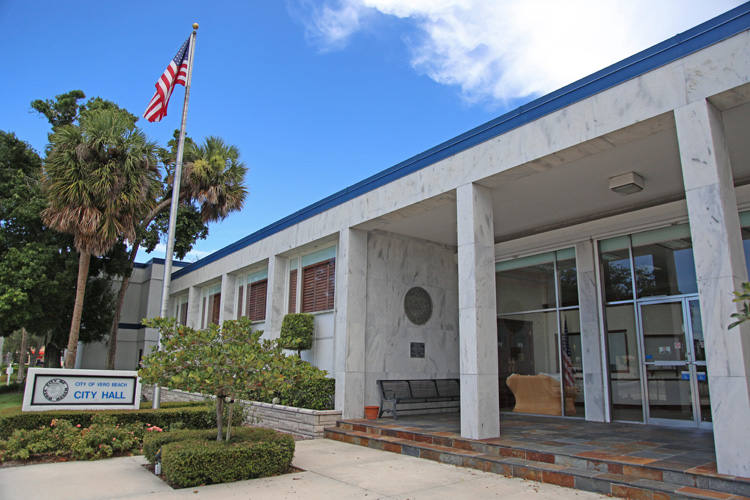
What will the city do with the so-called “Three Corners” property if a majority of Vero Beach voters reject the Nov. 8 referendum to allow the proposed development of the 17-acre riverfront parcel now occupied by an abandoned power plant?
“That’s a good question,” Vero Beach Mayor Robbie Brackett said.
There don’t appear to be any good answers – or options.
The City Council, which approved a Master Concept Plan for the Three Corners project with a 4-1 vote on Feb. 1, has been so committed to the development of a dining, social and recreational hub on the mainland’s waterfront that it has no Plan B.
In fact, Brackett said there haven’t been any meaningful discussions of alternative uses for the property.
“The council has been very supportive of this project, and based on my conversations around town, I’m optimistic it’s going to pass,” Brackett said. “People are excited about the possibilities. Waterfront property needs to be used.
“Ultimately, though, it’s up to the voters,” he added. “If they say no, we’ll have some decisions to make.”
City Manager Monte Falls said a failure to approve the referendum to amend the city charter and proceed with the project leaves few options – none of which would generate revenue for the city, and all of which would require the expenditure of tax dollars.
The most likely scenarios would involve:
- Transforming all 33 riverfront acres, including the 16 on which the city’s wastewater-treatment plant operates on south side of the 17th Street Bridge, into a mainland version of Riverside Park.
- Keeping the power plant parcel fenced off and idle until city officials someday embark on another attempt to develop the property into a revenue-generating venture.
Both scenarios almost certainly would result in the removal of the power plant, which could be dismantled for parts or scrap metal.
“If the referendum fails, we’ve got to make a decision sooner or later on the fate of the power plant building,” Falls said. “We haven’t really done anything to the structure since it shut down, but we’re going to have to do some kind of maintenance there eventually – unless we take it down.
“That would have to be a big consideration,” he added. “If a developer decides the building isn’t worth salvaging, it’s hard to imagine a city of 17,000 renovating it to the point where it could be something viable and usable for the community.”
Falls said selling the plant’s parts and scrap metal might cover the cost of removing the building.
“We looked at taking down the building a few years back, when Jim O’Connor was still the city manager, and I think we could’ve come close to breaking even,” Falls said. “Maybe we’d do better now.”
The option mentioned most by opponents of the development project was to turn the power plant parcel into a park.
To do so, however, the city would need to invest in capital improvements, such as walkways, landscaping and a parking lot, as well as construction of restrooms.
A park also would require regular maintenance, which Falls said would cost an estimated $300,000 annually if it extended over all 33 riverfront acres.
Vero Beach, though, already has 14 parks, covering 250 acres, which City Planning Director Jason Jeffries said was five times the amount of park lands needed for the level of service they currently provide.
“And if you include the beach parks,” Jeffries said, “we’re already serving more county residents than city residents.”
Mothballing the power plant parcel is another, less-costly possibility if the referendum is defeated, but both Falls and Brackett said it could take years for the city leaders to rally the community around a second shot at developing the riverfront.
“If it doesn’t happen now,” Falls said, “I don’t know what you change to get it there.”
Similarly, Brackett doesn’t know if the community’s enthusiasm for the project will ever be this high again.
“I think you get one bite at the apple,” he said, “and this is it.”
The City Charter allows the power plant property to be leased without a referendum, but only for recreational, artistic or cultural uses, Falls said, adding that an “incidental concession,” such as the Seaside Grill at Jaycee Park, could operate there.
But no commercial use – restaurants, hotels or retail shops – is permitted.
Falls said the cost of maintaining the property in its current state is minimal, requiring only that the city’s Public Works Department mow the grass on a monthly basis.
“That’s what we’d continue to do until the city decides what to do with that land,” he said.
Brackett said he expects a big turnout for the referendum, which will be on the same ballot with the governor’s race and local School Board and County Commission elections.
“It seems like most people want this to pass, but when you talk about ‘most people’ here, it’s hard to know how many of them are city residents – and only city residents can vote on the referendum,” Brackett said.
“So we’ll have to see what happens,” he added. “As Monte once told me: We’ve got 17,000 people in the city, but we’ve got 100,000 people in this county who have ‘Vero Beach’ as their address.”



